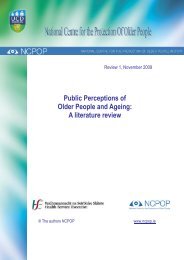Public Perceptions of Older People A literature review
Review 1 PP OP.pdf - National Centre for the Protection of Older ...
Review 1 PP OP.pdf - National Centre for the Protection of Older ...
Create successful ePaper yourself
Turn your PDF publications into a flip-book with our unique Google optimized e-Paper software.
linear trend showing increasing positive explicit attitudes toward older people<br />
relative to younger people commensurate with respondent age, there<br />
remained strong negative implicit attitudes toward older people amongst all<br />
participant age groups.<br />
Children’s attitudes are considered an important area <strong>of</strong> study, as they may<br />
be reflective <strong>of</strong> societal attitudes as a whole (Schwalbach & Kiernan 2002).<br />
Social learning is <strong>of</strong>ten considered one <strong>of</strong> the strongest determinants <strong>of</strong><br />
stereotyping and prejudice against stigmatised groups (Montepare &<br />
Zebrowitz 2002). Barrett and Cantwell (2007) asserted that early socialisation<br />
leads children to assume ideas and attitudes towards older people and ageing<br />
which become well embedded and taken for granted as they get older.<br />
A <strong>review</strong> <strong>of</strong> <strong>literature</strong> conducted by Montepare and Zebrowitz (2002)<br />
regarding children’s attitudes towards older adults revealed that the tendency<br />
to differentiate people based on their age begins in early infancy and that<br />
both negative feelings toward older adults and varied stereotypes emerge in<br />
the early preschool years. Other researchers similarly report that children as<br />
young as four or five have well defined ideas about older people and ageing<br />
and exhibit negative attitudes toward older adults (Cottle & Glover 2007;<br />
Gilbert & Ricketts 2008). Gilbert and Ricketts (2008) asserted children’s ideas<br />
and attitudes change and develop with age. It has also been suggested that<br />
children’s attitudes tend to become less negative, more differentiated and<br />
more elaborate with age (Montepare & Zebrowitz 2002). A study by Davidovic<br />
et al. (2007) revealed positive perceptions <strong>of</strong> old age in a sample <strong>of</strong> 162<br />
school children, which led them to the conclude that ageism is adopted later<br />
in life.<br />
Age may be an influential factor in the perceptions <strong>of</strong> older people and ageing.<br />
While some researchers assert that young people tend to hold negative<br />
attitudes which then develop into more positive attitudes as they get older,<br />
others have argued that ageist attitudes tend to be adopted in later life.<br />
Further research is needed to clarify the nature and direction <strong>of</strong> the<br />
perceptions and attitudes <strong>of</strong> older people.<br />
7.6.3 Knowledge and understanding <strong>of</strong> older people<br />
Researchers have suggested that ageism is not innate but develops over time<br />
(Lichtenstein et al. 2005; Davidovic et al. 2007). Such arguments promote the<br />
25









